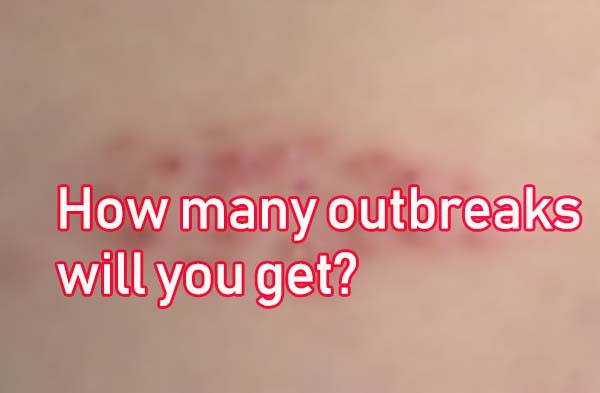How many outbreaks will you get?
If you've recently been diagnosed with herpes or are navigating life with the virus, one of the most common questions is, "How many outbreaks will I get?" While the experience of herpes can differ for each person, understanding what outbreaks are, how they vary, and the factors that influence them can help you manage the condition with confidence.

How Many Outbreaks Can You Expect?
The number of outbreaks a person will experience can vary widely. Some people may have frequent outbreaks, while others may go months or even years without any symptoms. Here are some general patterns and insights based on research and real-world experience.
After the initial outbreak, which can be more severe, many people notice that the frequency and intensity of herpes outbreaks decrease over time. This is largely due to the body's immune system developing a response to the virus. Once the immune system has been exposed to the herpes simplex virus (HSV), it can more effectively suppress it, leading to fewer outbreaks.
For the majority of individuals, the first year after infection tends to have the most outbreaks, with some people experiencing four to six outbreak during the first year. However, after the initial phase, outbreaks typically become less frequent.
On average, people with genital herpes (HSV-2) may experience one to five outbreaks per year after the first year. For those with oral herpes (HSV-1), outbreaks are often less frequent, especially if the virus primarily affects the mouth area, with some individuals going years between flare-ups.
The severity of these subsequent outbreaks can also decrease. What may have started as painful, extensive sores during the first outbreak may evolve into smaller, less painful lesions in later outbreaks. In many cases, outbreaks may not be as noticeable, and some people might not experience any symptoms at all, despite still carrying the virus.
Despite the reduction in frequency, outbreaks can still occur, especially when certain triggers arise. Stress, illness, hormonal changes, or sun exposure are common triggers that can cause the virus to reactivate. Although subsequent outbreaks are generally less frequent, the virus remains dormant in the body, making it possible for outbreaks to recur occasionally.
While subsequent outbreaks may not happen as often, they can still be managed effectively with antiviral medications and lifestyle adjustments, reducing the impact of herpes on daily life.
Factors That Affect Outbreak Frequency
The number and severity of outbreaks vary based on several factors. Here are the key factors that influence how often outbreaks occur:
- Immune System Strength: A person's immune system plays a critical role in managing herpes outbreaks. People with stronger immune systems, often due to good health, lower stress levels, and a balanced lifestyle, tend to have fewer outbreaks. Those with compromised immune systems, such as those with HIV/AIDS, may experience more frequent outbreaks.
- Stress Levels: Stress is one of the most common triggers for herpes outbreaks. Emotional or physical stress can weaken the immune system, making it easier for the virus to reactivate. Therefore, managing stress through practices like mindfulness, relaxation techniques, and exercise can help reduce the frequency of outbreaks.
- Medications: Antiviral medications such as acyclovir, valacyclovir, and famciclovir can help reduce the frequency and severity of outbreaks. People who take daily suppressive therapy (a low dose of antiviral medication) may have fewer outbreaks or even none at all. Episodic treatment (taking antiviral medication during an outbreak) can also help shorten the duration of outbreaks.
- Lifestyle Factors: Healthy habits, including regular exercise, eating a balanced diet, getting enough sleep, and avoiding smoking or excessive alcohol, can contribute to a stronger immune system and potentially fewer outbreaks. Certain lifestyle choices, such as not using condoms during sexual activity, can also increase the likelihood of transmitting the virus to a partner, even during asymptomatic shedding.
- Triggers: Specific triggers can vary for each person. Common triggers include hormonal changes (such as during menstruation or pregnancy), exposure to the sun, physical trauma or injury to the affected area, illness, and fatigue. Identifying your triggers and avoiding them when possible can help reduce the risk of outbreaks.
- Type of Herpes Virus (HSV-1 vs. HSV-2): People with HSV-2 (genital herpes) typically experience more frequent outbreaks compared to those with HSV-1 (oral herpes). However, HSV-1 can also cause genital herpes through oral-genital contact. HSV-2 is often more persistent and recurrent, while HSV-1 tends to be less frequent in terms of outbreaks.
- Age: Younger individuals may experience more frequent outbreaks in the first few years of infection compared to older individuals, as their immune systems may not have built up as much resistance to the virus over time.
Managing and Reducing Outbreaks
While you can't predict exactly how many outbreaks you'll have, there are steps you can take to minimize their frequency and severity. Here are some practical tips for managing herpes:
- 1. Take Antiviral Medications Daily suppressive therapy with antiviral medications can significantly reduce the number of outbreaks you experience. These medications lower the amount of the virus in the body, reducing the likelihood of outbreaks and lowering the risk of transmitting the virus to others.
- 2. Identify and Avoid Triggers Pay attention to your body and try to identify any patterns or triggers that lead to outbreaks. Keeping a journal of your lifestyle, stress levels, diet, and any other relevant factors can help pinpoint triggers and enable you to take proactive steps to avoid them.
- 3. Reduce Stress Stress is a common trigger for outbreaks, so finding healthy ways to manage it is key. Meditation, yoga, deep breathing exercises, and spending time in nature can all help keep stress levels low and your immune system strong.
- 4. Practice Safe Sex Using condoms or dental dams during sexual activity can help reduce the transmission of the virus, especially during outbreaks. Even when you are not experiencing visible symptoms, asymptomatic shedding is still a risk, so protection can help prevent the spread of herpes.
- 5. Get Enough Rest and Nutrition Maintaining a healthy diet and getting enough sleep are vital for overall health and immune function. Both can play a role in reducing the frequency of herpes outbreaks. Aim for a balanced diet rich in vitamins, particularly vitamin C and zinc, which are known to support immune health.
- 6. Know When to Seek Medical Help If you're experiencing frequent or severe outbreaks, or if you have difficulty managing symptoms, it's important to consult with your healthcare provider. They can offer personalized advice and potentially adjust your treatment plan to better manage the condition.
Conclusion
The question of "how many outbreaks will you get?" does not have a one-size-fits-all answer, as it depends on a variety of personal factors. Some individuals experience frequent outbreaks early on, while others may have minimal symptoms over time. Regardless of how often you experience outbreaks, the key to managing herpes is staying informed, adopting healthy habits, and looking for the right treatment.
By understanding what factors contribute to outbreaks and taking proactive steps to manage the condition, you can reduce the frequency and severity of outbreaks and lead a full, healthy life. Always consult with your healthcare provider to determine the best approach for managing herpes based on your unique situation.
No need woarry about herpes outbreaks! Meet nearby people with herpes

PositiveSingles is one of the most popular dating websites for people suffering from herpes and other STD. It was initiated in 2001. With 1,510,800+ members you are sure to find lots of potentail people around you.
Join and meet nearby people with herpes, browse profiles and chat now!
Your Immune System
The immune system's ability to respond to and suppress HSV triggers is a key factor in whether or not someone will experience frequent outbreaks. Differences in immune response may be the main reason that some people are bothered by frequent cold sores or genital herpes outbreaks while others are not. It's also the reason that both HSV-1 and 2 can pose serious challenges for infants, who have a limited immune response; and for people with compromised immune systems, including people with cancer, AIDS, severe burns, and people taking immunosuppressant medications.
For example, infants and people with compromised immune systems (those with cancer, HIV/AIDS, severe burns, or who are taking immunosuppressant medications) tend to experience severe recurrent outbreaks, because their immune system is weaker or weakened.
The healthier your immune system, the less likely you are to suffer from severe or numerous symptoms.
How Long You've Been Infected
In time, the severity, the duration, and the number of outbreaks a person with HSV experiences tends to decrease. That is true for both HSV1 and HSV2.
A larger number of people with oral HSV1 contracted the virus when they were children, so by the time those people reach adulthood, very few are bothered by their oral outbreaks enough to seek help or consider their symptoms a medical issue. That is because, over time, their immune systems formed antibodies to fight the virus, and they no longer have either severe and/or frequent outbreaks.
In contrast, the majority of Americans who are infected with genital HSV2 acquired the infection as teenagers or adults, so their bodies haven't yet developed a significant level of antibodies necessary to combat the virus, and thus, they still experience severe and/or recurrent outbreaks. However, as with oral HSV1, the number of outbreaks one experiences with HSV2 usually reduces the longer they're infected.
Type of Herpes and Where It's Located
Both HSV1 and HSV2 can infect a person orally and/or genitally, however, both infections will cause milder symptoms when they are outside of their preferred location. HSV1 prefers to infect above the waist, and HSV2 prefers to infect below the waist.
Experts estimate that around 30% of genital herpes infections are caused by HSV1, but only 2-5% of those infections cause recurring genital outbreaks. Therefore, most people infected with HSV1 genitally have very few, if any, genital herpes outbreaks. To further emphasize the difference in recurrence between a genital HSV2 infection and a genital HSV1 infection, one study showed that genital HSV2 causes physical symptoms 10 times more often than genital HSV1.
Average Outbreak Rate
- During the first year of infection, those with recurring outbreaks of HSV1 orally or HSV2 genitally experience an average of 4 to 6 episodes.
- For those with genital HSV1, on average, studies have shown about one outbreak per year.
- When an oral HSV2 infection occurs, recurrent outbreaks are uncommon. In one study, oral HSV2 recurred an average of 0.01 times a year in newly infected people.
Viral Type
A possible fourth factor affecting recurrence rate is viral type. According to another study, genital HSV2 infections were the most frequently recurring herpes infections, followed by oral HSV1, genital HSV1, and last of all, oral HSV2.
Have herpes & feel alone? Meet nearby people with herpes

PositiveSingles is one of the most popular dating websites for people suffering from herpes and other STD. It was initiated in 2001. With 1,510,800+ members you are sure to find lots of potentail people around you.
Join and meet nearby people with herpes, browse profiles and chat now!
Know more facts about herpes outbreak:
First herpes outbreak | Recurrent herpes outbreaks | Stages of a herpes outbreak | How long does a herpes outbreak last | How often do herpes outbreaks occur? | What can trigger herpes outbreaks? | How to recognize a herpes outbreak? | How to prevent herpes outbreaks | Viral shedding | Herpes treatment | How to strengthen your immune system
